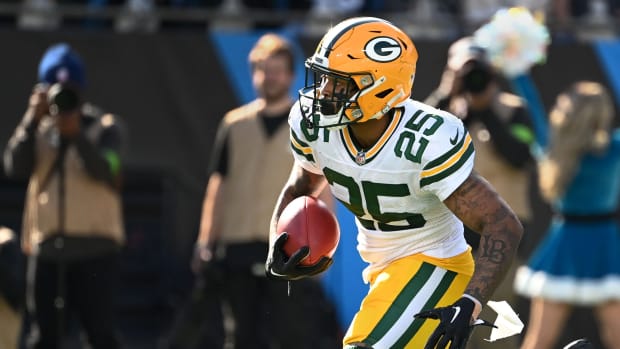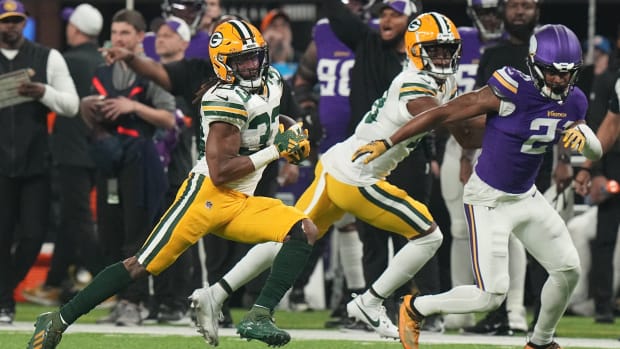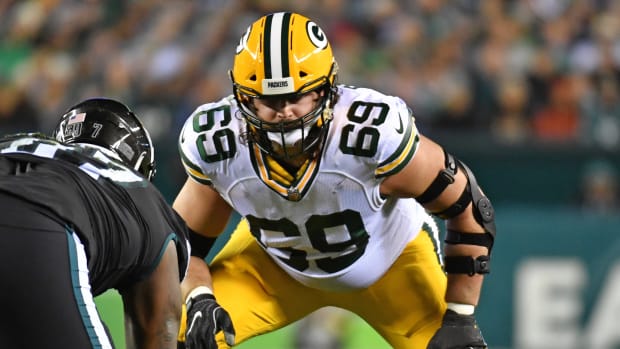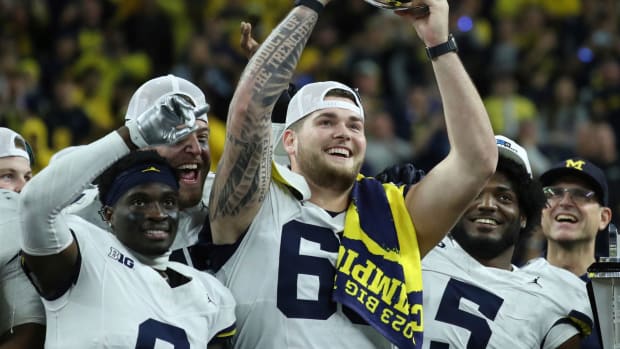Turner, Kirksey and Amos: ‘We’re People’
GREEN BAY, Wis. – Hoping to build on momentum from Thursday’s team meetings on social justice, the Green Bay Packers presented three of their most passionate spokesmen, offensive lineman Billy Turner, safety Adrian Amos and linebacker Christian Kirksey, on Zoom calls after Friday’s practice.
Here is some of what they said.
Turner, on the experiences of he and his black teammates.
“The experiences that are spoken about on our team go from being profiled by the police and having guns drawn on you all the way to being arrested for no apparent reason. Thank God, we’re football players and people know who we are because you get a second chance, you have an opportunity to potentially not have a gun drawn on you. At the end of the day, it doesn’t matter if we’re athletes because you don’t know who’s behind those windows and doors when you’re pulling that person over. You might just see a dark figure, it might look like a car an African-American is driving. There are stereotypes and everything. So, we’ve talked about profiling and, to be honest with you, from the point I was able to leave the house on my own and my parents trusted me, I’ve been told from Day 1, if I ever get pulled over, keep my hands on the steering wheel and keep my mouth shut. Everything the officer says, regardless if he’s throwing racial slurs at you, regardless if he’s talking down to you, talking negatively, because if you do not, you have the potential to lose your life.”
On Twitter, Amos said, “I’m not here solely (for) your entertainment.”
Asked to elaborate, Amos said: “First and foremost, we’re people. A lot of us come from very humble beginnings and we’ve reached this status to where we can make a lot of money to play a sport but don’t forget we worked our way to get there, but we still have families, we still have families at home, we still have people around us and we still aren’t immune to certain things that are going on because we are people. When I’m voicing my opinion, I’m voicing my opinion just as much as you are. Just because I have this title and you feel as though I get paid a lot of money, that doesn’t mean I have to be quiet.”
On Twitter, Kirksey questioned Kenosha Police Chief Daniel Miskinis, who noted that two people who were shot on Tuesday night were out after curfew.
“I was highly disappointed. I was highly disappointed. Being a leader, there’s certain things that you cannot say as far as if people weren’t past curfew, then the shootings may not have occurred. I think that’s a slap in the face. You can’t blame the victim. You can’t do that. You have to be cautious of who’s watching you. You’ve got parents of the people who died that are watching you. You’ve got to be sensitive to how they feel about that. You don’t go around and say, if something was to happen to a young lady, you can’t say, ‘If she wasn’t at this particular party, then that wouldn’t have happened to her.’ Or, ‘If she wasn’t wearing this certain outfit, things wouldn’t have happened to her.’ You don’t go around saying things like that. You’re a leader in this community.
“That’s a slap in the face. That’s not right. So, I did call out that police chief and let him know that that’s not right. I think more and more people need to call out what’s right and what’s wrong, and not hide behind a shadow. That was just me expressing myself and expressing the pain behind people. I think some people are not cautious about what they say. It’s different when it hits home. Imagine if that was somebody in your family, or imagine if that was somebody who was close to you. Would you still say those words? Would you still say the things that you said? I think people just around the world got to realize and imagine if that was somebody who was close to you, how would you feel?”
Turner, on the conversation he’d like to have with police.
“Honestly, if I was able to have a conversation with law enforcement, I would like to understand the rules and the guidelines that are in place for law enforcement when it comes to pulling somebody over and subduing someone. Three grown men on one is an unfair advantage. There should be no reason that you have to pull your gun out. Unless that man pulls a gun on you, there should be no reason you have to pull a gun on him. Especially when his back is to you. I would love to understand and to learn the steps, the process when it comes to subduing someone. And part of the issue that I have is, it’s been proven and it’s been seen on camera so many times, when a white individual has a weapon in his hands, how police officers react to that. When a black man has no weapon in sight, yet he ends up with seven bullets in his back, yet he ends up dead, yet he’s getting choked out on the street – there’s no weapon in sight. I want to understand what the difference is there and I want to understand why some of these officers, not all of them, why my skin is a threat. It shouldn’t be that my skin is a threat. If anything, it should be my size and my stature.
“I saw something online about police brutality and the situation at hand and everyone wants to say, ‘Oh, the guy had a knife, the guy was reaching for something, he was running away from the police.’ Like, man … OK. OK. And people want to understand why black men, women and children are coming down on the police force so hard. Not all police officers are bad. No, not all police officers are bad. There’s some great ones out there and I know some of them. But when it comes to history and when it comes to police officers and the things that we’re shown by media, they pull this guy over, they stop this guy, they shoot at his guy, they kill this guy … Why? Because he fits a description? What do you expect from me when I get pulled over by a police officer based off of everything that happens to someone who looks like me? Because that police officer, regardless of me knowing him or not, he fits a description. That’s why I’m scared.
“So, I would love to have a conversation and I would love to learn the guidelines. And if those guidelines and those rules are not followed by police officers, due process. They should be held accountable for their actions no differently than I am held accountable for my actions. … When you were pulled over by a police officer, did you lose your life? Probably not. Probably because the color of your skin is white, to be honest. And that is not fair. And that is why we are so mad and we are so furious about these things that are going on, because it is just not fair. There’s not many black people in this country, and the fact that they’re 40 pecent of the people that are incarcerated in the prisons around this country are black, that’s just outrageous. That’s just not fair. And that’s what we are fighting against.”
Amos, on changing hearts and minds as well as laws:
“I don’t think that’s fully ever going to happen. There’s always going to be bad people, there’s always going to be racists. We just have to make sure we’re holding people accountable. I think that’s the only thing you really can do because it’s hard to judge everybody’s heart. I don’t know really how you think, how you feel, but I can try to do something to control your actions, whereas if you’re breaking a rule, if you’re violating something, then you can be held accountable.”
Kirksey, on spreading his message to those who don’t want to listen:
“It’s hard to get to people, especially if you don't know them, you haven't seen them in person. A lot of people can say a lot of things, hide behind a computer screen, which a lot of people do. So, you can't too much pay attention to comments, because sometimes people just wanted to spark something up knowing that something is right but they purposely want to be wrong just to spark up anger or just to spark up a conversation. All we could do is keep illustrating love. All we could do is keep illustrating doing the right thing. To people who just say, ‘Shut up and play football,’ that's just ignorant. Why, when it comes to a football game, you love me, but when it comes to me talking about people and real-life issues, now you all of a sudden have a problem with me? I'm more than just a football player. I think that people forget that and they look at us as entertainers and not people. I don't go to a person's job and tell a teacher, 'Just teach a class and shut up.' I don't say that, and I think people, when it comes to an athlete, they don't look at us in the same light. No, we're people. We have rights just like everyone else. We vote just like everyone else, we have families just like everyone else and we have real-life issues just like everyone else.
“So, on Sundays, if you can cheer us on and say I'm your favorite player, or if you can criticize me on a missed tackle or missed assignment, then I have a right to express my feelings. I have a right to say this is my belief or this is what I think or this is what I stand up for. That's what I want to tell people, whoever's watching, is that our voice matters. Our opinion matters and we have to stop making it seem like we're just an athlete and, when it comes to real-life issues, we’ve got to be blind to it. I refuse to do that because, at the end of the day, I have a family that I have to protect and I have to take care of and I have friends back home, family back home, that are going through real-life challenges, and who am I to be blind to that. What kind of man would I be to be blind to that? “




